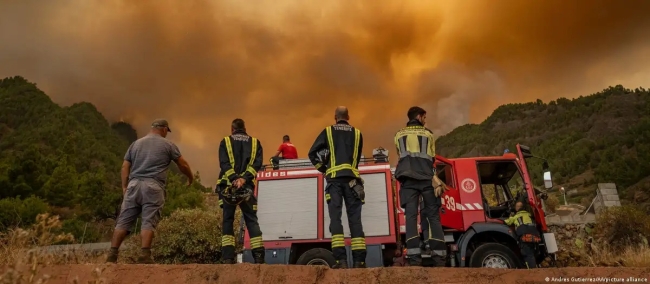Wildfire on Spain's Tenerife burning 'out of control'
A wildfire that ignited within a mountainous national park on the Spanish island of Tenerife on Wednesday has rapidly expanded, officials said.
Hundreds firefighters are trying to bring the major blaze under control on the largest of Spain's Canary Islands.
How big is the blaze?
The fire grew to cover an area of 1,800 hectares (4,450 acres) within a span of 24 hours.
The fire has now extended across 22 kilometers (13.7 miles) of dry woodland, engulfing both sides of Mount Teide, Spain's tallest peak. Access to this region has now been affected.
Fernando Clavijo, the regional leader, said during an evening press briefing in the island's capital, Santa Cruz, that the wildfire is spiraling "out of control," and the situation is dangerous.
"Our goal is for it to stop gaining ground," he said, adding that the immediate objective was to employ defensive measures for Wednesday night.
"I am confident that the more than 200 ground forces that will be active tonight will be able to contain the two most worrying fronts," he said on X, the social media platform formerly known as Twitter.

What is the latest?
Efforts to combat the wildfire involve the deployment of 14 aircraft and a combined contingent of 250 firefighters and military personnel.
A water-dropping seaplane arrived on Wednesday afternoon from mainland Spain, with two additional seaplanes expected to arrive on Thursday morning.
Vicky Palma, an adviser on wildfires to the Tenerife council, said on Canarias Radio that the anticipated drop in nighttime temperatures to around 20 degrees Celsius (68 degrees Fahrenheit) might intensify wind patterns in the region.
Pedro Martinez, the chief of the island's emergency services said, "We don't rule out that tomorrow we'll again see intense fire activity."
Rosa Davila, who leads the Tenerife council, said all mountain access points on the island, including the popular tourist attraction, Mount Teide, had been closed off.
Evacuations underway
Canarias Radio reported that about 150 individuals have been evacuated so far from several villages situated in the northeast area of the island, which mainly comprises of farms and vacation homes.
A shelter for dogs took precautionary measures by evacuating some of its most vulnerable canines and those with respiratory issues to shield them from the smoke.
The two airports on Tenerife are operating normally, according to Spain's airport operator Aena.
A heat wave struck the Canary Islands in recent weeks, leaving numerous regions of the already desert-like archipelago extremely dry and heightening the wildfire risk.
Throughout this summer, firefighting teams have successfully extinguished a series of forest fires on the islands of Gran Canaria and La Palma.
Europe has been grappling with waves of extreme weather over the summer, a situation further exacerbated by the impact of climate change.


